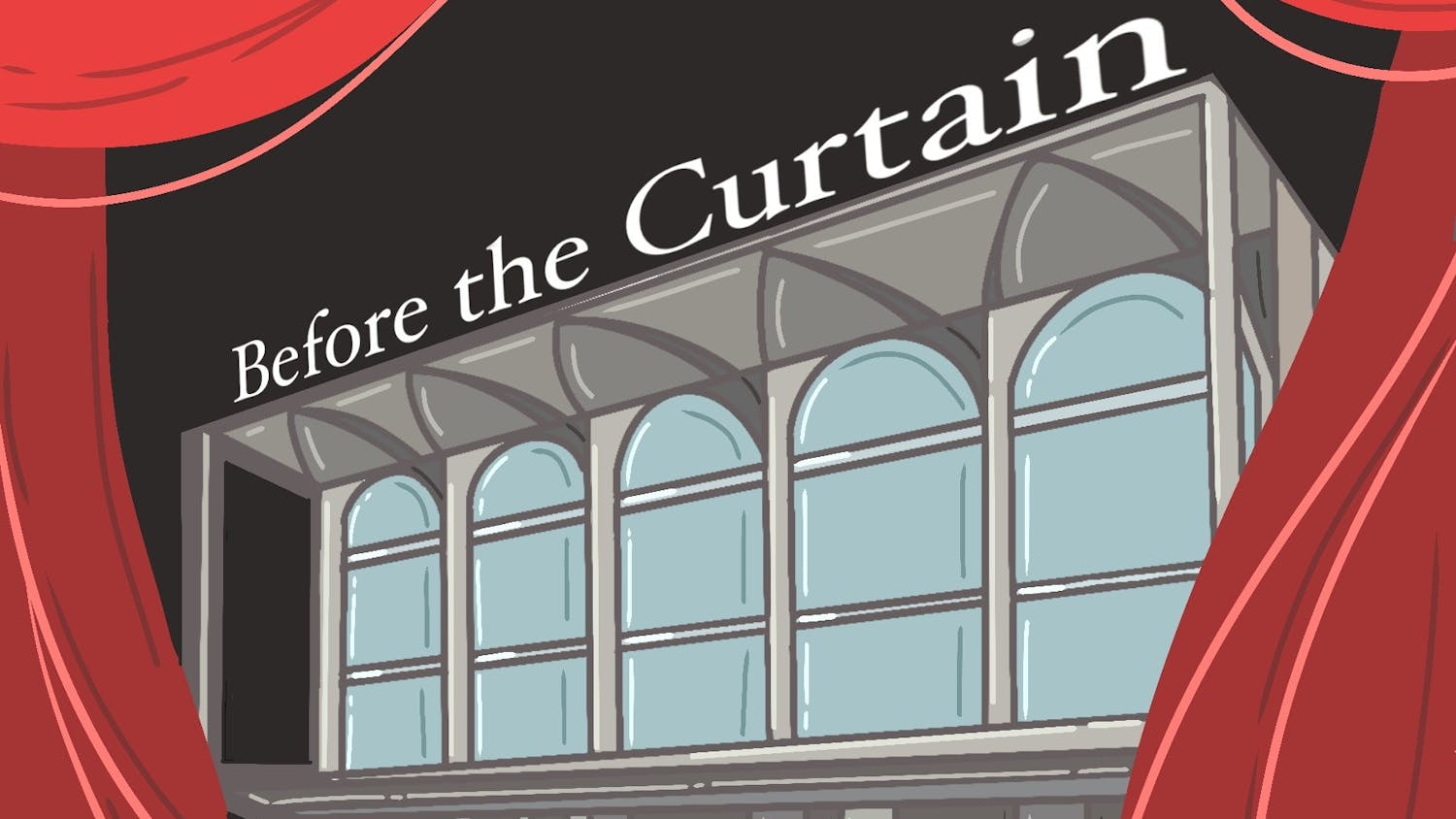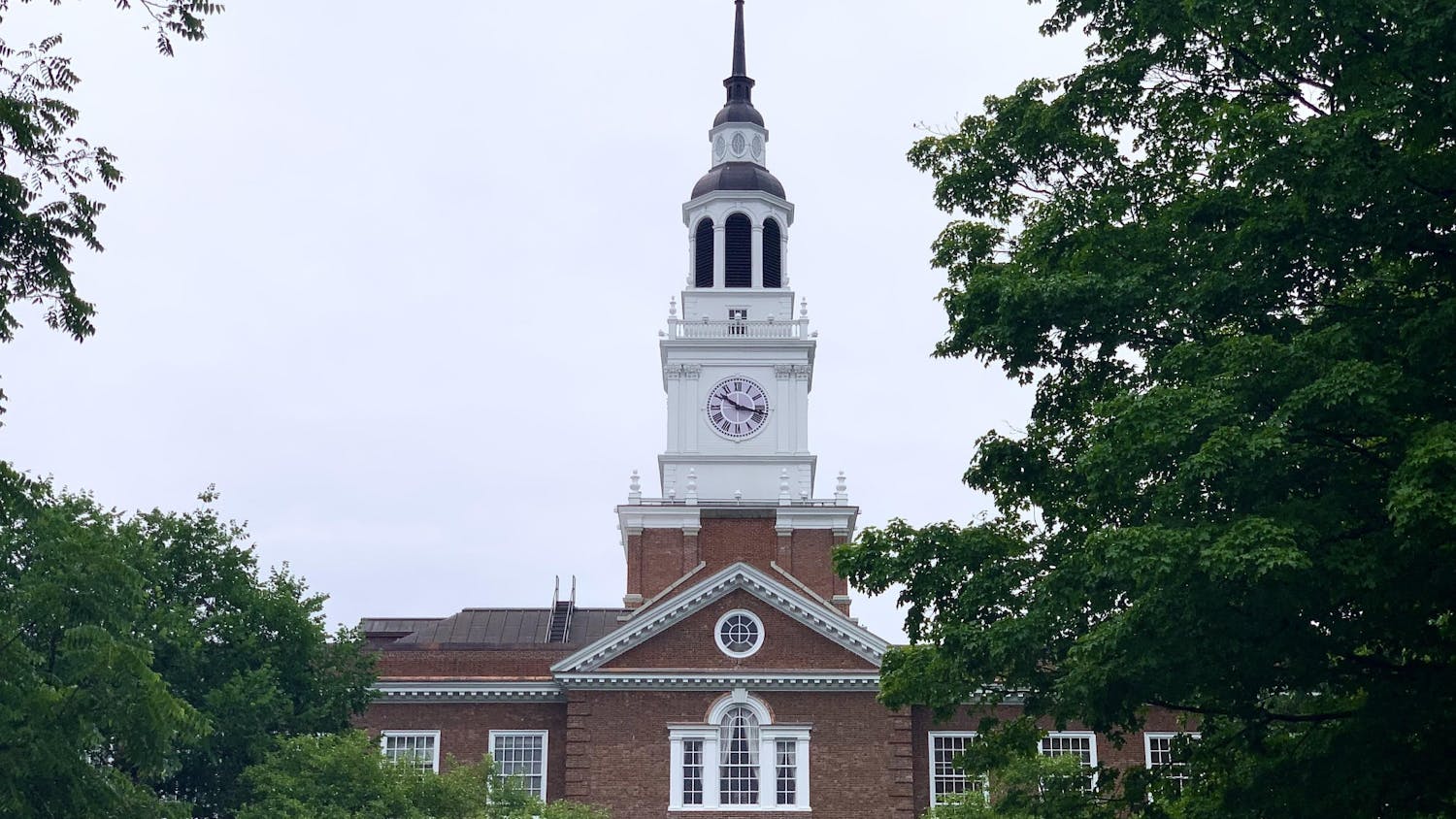This article is featured in the 2023 Commencement & Reunions special issue.
Senior thesis season is in full swing, with graduating members of the Class of 2023 presenting projects from various academic departments. While a prototypical example of a thesis may look like a lengthy research paper, for many students studying a creative field, their senior thesis functions as a creation of art rather than academic research. These can include theater productions, novels, films, collections of short stories, and more. A few students from the graduating Class of 2023 reflect on their experiences producing creative projects for their senior theses.
Maggie MacDonald ’23, a theatre major, submitted a production titled “Orphan Play” for her senior thesis. Based on MacDonald’s own life, the play follows an aspiring playwright who draws on memories and past experiences to produce a play of her own. “Orphan Play” was derived from an initial draft for MacDonald’s thesis that she ended up scrapping. One of the characters from her original piece, based on MacDonald’s own mother, served as inspiration for this new play and its semi-autobiographical structure.
MacDonald said there were difficulties getting her new thesis proposal approved, primarily due to the semi-autobiographical nature of her play.
“Initially, it was really hard for me to get permission to portray myself,” MacDonald said. “They thought that because [my play] was so personal, that I wouldn’t be able to handle it, that it’d be too emotionally draining, but it was really important to me because it’s my story and it’s my work, and I wanted to tell it the way it was intended to be told.”
In the end, it was former theater professor Liliana Padilla — who has since left Dartmouth — who enabled MacDonald to take on the roles of both writer and actress, mentoring her throughout her writing process.
“She had my back in a really lovely way, and was able to convince the faculty that I should be the one to [perform in my play],” MacDonald said. “Performing [“Orphan Play”] was emotionally draining, but in a rewarding way. I’m happy that I did it.”
Tulio Huggins ’23, who is double majoring in history and English with a concentration in creative writing, wrote a short story collection for his thesis titled “Meet Me Outside the Sanctuary: Stories.” Also semi-autobiographical, the book follows a series of incidents which occur at an evangelical church youth group, a setting which Huggins is closely familiar with.
“I grew up going to church youth groups — that was a very important part of my life and has influenced a lot of who I am … I think it’s a very unique cultural phenomena,” Huggins said. “I could tell endless stories of drama — of the good, the bad and the ugly — to show people what life is like within these unique scenarios.”
Unlike MacDonald, Huggins’s process of creating his thesis began much earlier in his Dartmouth career, all the way back in his sophomore fall.
“I took CRWT 10, ‘Introduction to Fiction’ with professor Alexander Chee … who told us to write a story that you would tell others if someone were to ask you,‘what’s a good story?’” Huggins said.
This prompt inspired Huggins to reflect on stories based off of his youth group. In addition to including more light-hearted, humorous anecdotes, Huggins’s work also deals with more serious issues he witnessed while involved with the church.
“One of my favorite [short stories] is called ‘Cassia.’ It kind of hits close to home because it deals with abuse in the church and seeing some of my friends in my youth group have abuse in their homes,” Huggins said.
Due to the nature of Huggins’s fictional retellings, he developed a special relationship with his work.
“It’s a unique connection because you’re telling a story that’s very close to you,” Huggins said. “With a creative writing thesis, you have all the reins to that story, you can tell it exactly how you want to tell it. I think that’s what I was doing. I was telling about my own experiences exactly how I wanted to tell them.”
Mariah Hernandez-Fitch ’23, who majors in film and media studies with a minor in Native American and Indigenous studies, directed a short film titled “Ekbeh,” which translates into “to build” or “to cook” in Houma, Hernandez-Fitch’s Indigenous language. The film explores themes of forced assimilation and loss of language through the lens of Houma’s enduring culinary culture, both deeply personal subjects to Hernandez-Fitch and her Houma background.
“My language has not been alive for a century. Due to efforts with linguistics and the Houma Language Project, they sort of revitalized the language through Choctaw and Chickasaw,” Hernandez-Fitch said. “I wanted to honor my family and Dulac, Louisiana, which is where I’m from.”
Hernandez-Fitch said her film primarily focuses on her younger sister and the process of cooking gumbo, a staple dish in her culture.
“I start off with my little sister, who tells a tale about our culture and how language and land means a lot to us, how a lot of that has been taken away due to assimilation and practices against Native culture,” Hernandez-Fitch said. “Then I show you how to cook gumbo. The one thing that remains the same is our food. Through food, we sit down and we cook and we tell stories … food itself has made our culture able to sustain itself and come alive.”
Developing a film on such an intimate topic also posed its own set of challenges to Hernandez-Fitch as she was producing “Ekbeh,” mostly concerning the accessibility of her story to unfamiliar viewers.
“At a certain point, I realized maybe many people might not understand [my film],” Hernandez-Fitch admitted. “But my family will, and I think that was the important message I learned through this process.”
Hernandez-Fitch also emphasized how filmed theses fundamentally differ from more conventional thesis forms, namely research papers and essays.
“I think a lot of people can’t read through a 60-page thesis, but they can watch an eight-minute movie and get the point,” Hernandez-Fitch said. “One of the best experiences I had was actually the film showing, and seeing my work with people I love and care about.”
McKenna Kellner ’23, a studio art major, also spoke about how her thesis, a collection of architectural drawings titled “Playhouse,” doesn’t fit the mold of a traditional thesis.
“It’s more of a project than it is a thesis — we’re not required to write anything necessarily … It’s more for the development of a body of work with a specific conceptual or material goal,” Kellner said. “It’s about thinking about where your work comes from and artists who are doing similar things to you … and trying to see how that applies to your own work.”
Kellner also spoke about how it was initially difficult for her to articulate aspects of her project, given the strictly visual nature of her thesis.
“I think it was difficult putting my project proposal into words,” Kellner said. “It’s not something that’s really taught in classes necessarily: how to talk about your artwork and your practice.”
Nevertheless, Kellner’s work is formed on the basis of a coherent narrative, one entrenched in memories of a past self. “My proposal for the project was on abstractions of floor plans and elevations in reference to personal memoir — places I had grown up in, places I had been — to sort of narrate a story about physical place and belonging and movement and misplacement,” Kellner said. “Conceptually, there’s an essay by bell hooks called ‘Homeplace’ that a lot of my project is based off of, which is … focused on the idea of building a dream house or an imaginary house, as even those imaginary feelings are rooted in a real sense of poverty.”
Kellner also emphasized the importance her peers and faculty mentors had on encouraging her to develop and expand on her ideas for her thesis.
“I took an advanced printmaking class in the fall, and the class was only six people, and a lot of them were [studio art] majors,” Killner said. “We had a really great group dynamic, so we worked a lot together.”
It is this combined sense of community and comparative progress that Kellner emphasizes reflecting on her experience.
“I think [the senior thesis] is the best way to push yourself to make the best work you can and also develop relationships with faculty directly,” Kellner said.
Underlying all of the senior theses is an overwhelming urge to seize individuality and express a story that needs to be told, no matter the medium. In addition, faculty members as well as fellow students backed these creative pursuits. Indeed, the senior thesis is more than simply demonstrating an itching passion. It is about producing a work that is wholly and uniquely their own.
Huggins encouraged future seniors to explore a thesis and discover this unique sense of ownership for themselves.
“Find a story that you’ve been wanting to tell, whether that be something that you couldn’t tell or haven’t had the opportunity to,” Huggins said. “You can tell a story that maybe only you can tell.”




